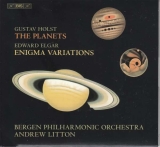 Edward Elgar: Enigma-Variations op. 36; Gustav Holst: The Planets op. 32; Bergen Philharmonic Orchestra, Andrew Litton; 1 SACD BIS 2068; Aufnahme 2013/2017, Veröffentlichung 07/2019 (82'42) – Rezension von Remy Franck
Edward Elgar: Enigma-Variations op. 36; Gustav Holst: The Planets op. 32; Bergen Philharmonic Orchestra, Andrew Litton; 1 SACD BIS 2068; Aufnahme 2013/2017, Veröffentlichung 07/2019 (82'42) – Rezension von Remy Franck
Haben wir hier die klanglich opulenteste, unenglischste, unphlegmatischste, unpathetischste aller je gemachten Aufnahmen der Enigma Variations? Andrew Litton lässt das Bergen Philharmonic prächtig und voller Elan, klanglich schlank musizieren. Seine Tempi sind dabei fast so schnell wir jene von Adrian Boult, viel schneller jedenfalls als die der meisten seiner Dirigentenkollegen.
Auch in den Planeten von Gustav Holst ist Litton unter den Rapiden, mit Tempi, die jenen von Karajans zweiter Aufnahme (DG) sehr ähnlich sind. Auffallend hier wie dort ist die langsame Abwicklung des letzten Planeten, Neptune the Mystic.
Nun ist das Tempo ja nicht allein maßgebend für den Höreindruck. Schnelle Tempi können leicht zu einem aalglatten Musizieren führen, in dem fehlende Artikulierung, fehlender Atem und fehlende Proportionen der Musik ihre Ausdruckskraft nehmen. Das ist hier in beiden Interpretationen der Fall. Littons atemloses Dirigieren lässt die Musik flachbrüstig und oft nur laut oder sonst einfach banal werden. Wo bleibt hier die Seele, wo bleibt der Lyrismus? Für eine derartige lustfreie, entseelte Akkordarbeit habe ich nichts übrig.
Do we have here the most opulent, most un-English, the least phlegmatic and pathetic of all the Enigma Variations recordings? Andrew Litton brings the Bergen Philharmonic to a splendid and slender sound, full of verve. His tempi are almost as fast as those of Adrian Boult, much faster than those of most fellow conductors. Also in Gustav Holst’s Planets Litton is on the fast track, with tempos very similar to those of Karajan’s second recording (DG). Now the tempo is not the only decisive factor for an interpretation. Fast tempos can easily lead to an eel-smooth music-making in which the lack of articulation, breath and proportions deprive the music of any expressiveness. This is the case here in both interpretations. Litton’s breathless conducting makes the music flat-chested and often only loud or otherwise simply banal. Where’s the soul here, where’s the lyricism? I really don’t’ like this kind of uninspired piecework.






















